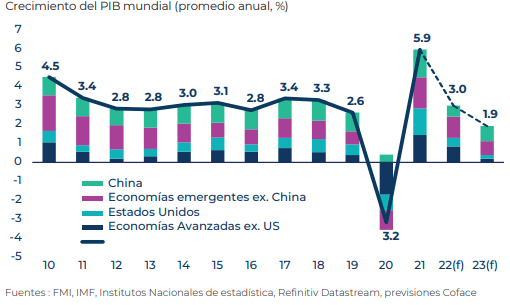U.S. President Joe Biden’s proactive industrial policy was highlighted in a geopolitical analysis conducted by French credit insurer Coface, in collaboration with the French Institute of International Relations (IFRI).
Despite his tattered image and the hysteria of the national political debate, President Biden has started a real revolution in the country since 2021: his proactive industrial policy (Infrastructure Act, Inflation Reduction Act, Chips Act) signals the end of the liberal cycle initiated by Ronald Reagan 40 years ago, being a real turning point in the fight against climate change.

However, Coface and IFRI believe that the Europeans will have to obtain some relaxation of the protectionist measures of the Inflation Reduction Act (IRA).
Although a Manichean view of the world allows it to support Ukraine and Taiwan against the Russian and Chinese regimes, the country’s economic and financial intertwining with China complicates the government’s strategic economic calculations.
While he is the undisputed leader of the Communist Party, Xi Jinping faces significant economic and social challenges. The end of the «Covid-zero» policy and the reopening of the borders could be perceived as an opening.
However, the same analysis indicates that the precipitous rejection of the draconian sanitary measures introduced in 2020 could undermine public confidence in the Party, as well as that of foreign economic players with respect to China, which has become a risky market, especially when new US measures to control semiconductor exports could weaken the Chinese innovation ecosystem.
Industrial policy
Moreover, the proximity of Taiwan’s presidential elections in January 2024 is unlikely to reduce Chinese military pressure in the Strait.
Simultaneously, the Russian economy is surviving thanks to the Central Bank policy and the circumvention of sanctions with the confirmed or suspected complicity of some countries such as Turkey and China.
However, the European oil embargo and the price ceiling threaten budgetary stability.
In Ukraine, the front line stabilized despite the battles of Bajmut and Soledar could be shaken by a new Russian offensive and there are no peace negotiations in sight.
The shipment of more and more heavy weapons by the West brings risks of escalation.
Unlikely in the short term and by definition difficult to anticipate, one possible path would be the departure, organized or forced, of Vladimir Putin, weakened in the eyes of Russian elites by the mistakes of his strategy and the risks of war for the country, add Coface and IFRI.
Regional competition continues in North Africa/Middle East in the context of the US withdrawal.
Regimes in oil and gas producing countries are taking advantage of the price rise linked to the war in Ukraine to consolidate their position (Algeria, Egypt) and embark on the green transition (Saudi Arabia, United Arab Emirates, Qatar).
At the same time, climate stress is intensifying, and with it food insecurity and social unrest.
![]()

